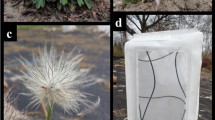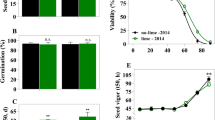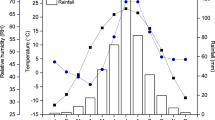Abstract
THE question of the longevity of buried seeds is always recurring, as witness the recent revival of the fable of mummy wheat. There is abundant evidence that the embryo of the wheat grain perishes relatively soon, in ten years or less under ordinary conditions. Respiration goes on until the substance of the embryo is burnt away ; extreme desiccation may prolong the process. Other seeds, however, do retain their vitality for much longer periods when dry, and when buried in earth germination may be indefinitely delayed. Possibly the tension of carbon dioxide in the soil gases slows down the respiration process ; again, we have found that humus, particularly of deep-seated peat, contains substances inhibiting germination, even when the conditions of moisture, aeration and temperature are optimum.
This is a preview of subscription content, access via your institution
Access options
Subscribe to this journal
Receive 51 print issues and online access
$199.00 per year
only $3.90 per issue
Buy this article
- Purchase on Springer Link
- Instant access to full article PDF
Prices may be subject to local taxes which are calculated during checkout
Similar content being viewed by others
Author information
Authors and Affiliations
Rights and permissions
About this article
Cite this article
HALL, A. Longevity of Seeds. Nature 134, 932–933 (1934). https://doi.org/10.1038/134932b0
Issue Date:
DOI: https://doi.org/10.1038/134932b0
Comments
By submitting a comment you agree to abide by our Terms and Community Guidelines. If you find something abusive or that does not comply with our terms or guidelines please flag it as inappropriate.



